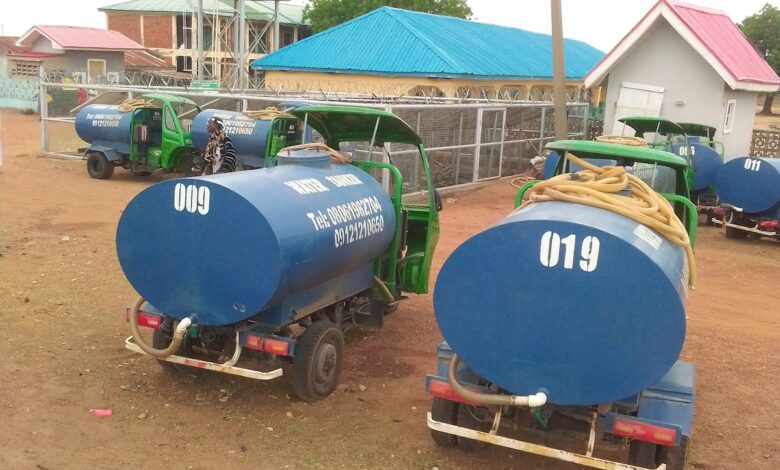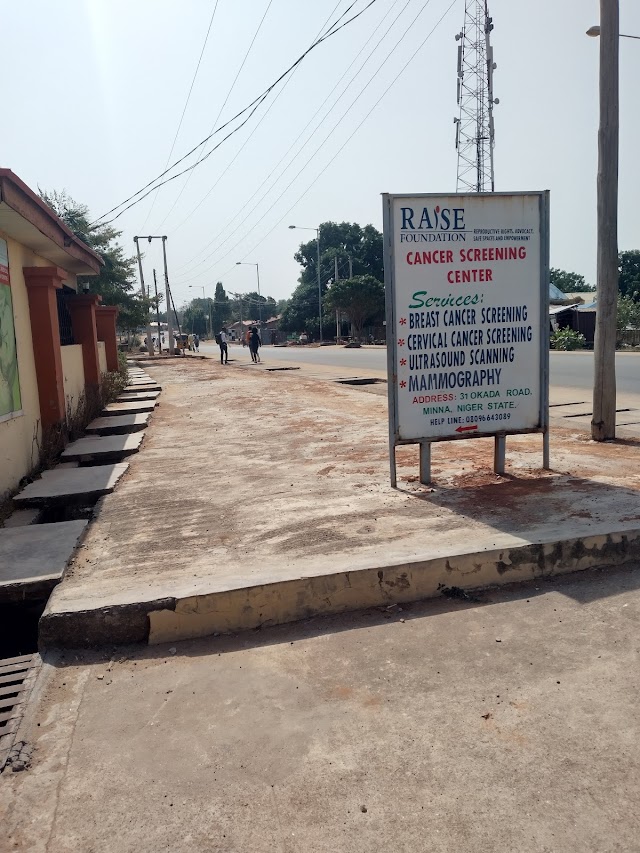
At about 8 a.m. every day, Danlami Ahmadu rides one of the tricycles bearing water tanks (popularly called blue trucks) parked in front of Limawa Model Primary School in Minna, Niger State, North-central Nigeria, to any household that requests for water within the metropolis.
Ahmadu works with the water intervention project of RAISE Foundation, a non-governmental organisation, located in the heart of the city. Although the foundation focuses on the improvement of maternal and child health, women empowerment and girl-child education, its water intervention project aims at easing the pains of residents (especially women and children), and prevents outbreak of waterborne diseases occasioned by acute water shortage.
Ahmadu, who has been working with the foundation for the past three years, and maintained the routine of riding a tricycle nearly every day (except during festive periods) tells HumAngle that the water project has about 10 blue trucks it uses to supply water to different locations within the city.
“Each water tank is of 1,500 capacity, and costs N3,000 to deliver to any location,” he says. “Before now, it used to go for N2,500, but due to cost of maintenance the price was increased.”
When HumAngle visited the project site located in front of Limawa Model Primary School along the Western Bypass, it discovered that the source of water was from a motorised borehole. It has a fetching point by the left hand side, an overhead tank beside the school gate, and solar panels of about six feet long, arranged in five rolls on the ground.
The mobile tankers are positioned beside the solar power and take turns at the fetching point. Limawa Model Primary School is connected to the tank through an outlet provided inside the school for the staff and pupil’s use. Some residents in the nearby Kpakungu community also fetch from the same point.

Unending water scarcity
The perennial water scarcity in Minna metropolis has continued for many years – administration after administration – without end in sight. During his tenure as governor, Mua’zu Babangida Aliyu declared two consecutive years as “Year of Water,” and earmarked the lion share of the state’s annual budget for the two years. Also, the present administration of Abubakar Sani Bello had earmarked N2.38 billion and N1.16 billion in 2016 and 2017 budgets respectively, yet water scarcity persists in the state.
At the height of the dry season, which is always between January and April, when many wells and boreholes in the city have dried up, few households and businesses rely on water supply from the state’s Water and Sewage Corporation, since major parts of Minna are not reticulated. Others rely on local water vendors, popularly called mai ruwa. But in the event of electricity failure and the public water board’s inability to distribute water, the reticulated areas also suffer the same fate.
This situation makes residents patronise water vendors who sometimes get their water from unhygienic or untrusted sources to meet up with the high demand.
The calamity
According to the United Nations International Children’s Emergency Fund (UNICEF), poor access to improved water and sanitation in Nigeria remains a major contributing factor to high morbidity and mortality rates among children under five.
The use of contaminated drinking water and poor sanitary conditions, it said, result in increased vulnerability to water-borne diseases, including diarrhoea which leads to deaths of more than 70,000 children under five annually.
The United Nations (UN) Sustainable development Goal target 6.1, however, calls for universal and equitable access to safe and affordable drinking water. The target is tracked with the indicator of “safety managed drinking water services” – drinking water from an improved water source that is located on premises, available when needed, and free from faecal and chemical contamination.
Some good news
Suleman Mustapha, a civil servant and resident of Dutsen Kura in Minna, is one of the residents who patronise the blue trucks. Sometime last year, his four-year-old daughter was discharged from the General Hospital after battling cholera. He suspected it was as a result of the water the family got from water vendors and vowed never to patronise them again depite the water scarcity within the metropolis.
“When I discovered the blue trucks, I began to get my water from them, and stopped buying water from mai ruwa,” he says. “The advantage is that you are sure you are getting clear and hygienic water direct from a borehole, even if you pay a little higher than you pay the mai ruwa.”
Mustapha used to buy water from the water vendors at N500 per truck (which contains 12 jerrycans of 20 litres). The same quantity goes for N1,000 during acute water scarcity in the city. His family consumes about three trucks per week. “So in the long run, the cost may even be higher than that of blue trucks,” he concludes.
But for Abdulrahman Shuaibu, a resident of Tunga, it is more convenient for households with small storage facilities to buy and share the water from the blue tanks. “Compared to getting a big water tank of 10,000 litres, which is sold by the water board at N10,000, you can easily buy the 1,500 litres of blue tank and share with one or two of your neighbours, especially if you don’t have big storage facilities,” Shuaibu says. “It is cheaper and more convenient.”
Despite the conveniences and cost, residents complained that it is difficult to get water supply from the blue trucks due to high demand.
“You may call them for hours and nobody will pick your calls. And when you visit the project site, you will discover there is a queue,” Mustapha says. “Sometimes you keep going there for days before it gets to your turn.”
But corruption has crept into the process of getting water supply from the site, Mohammed Idris, another resident, tells HumAngle. “When you come here, you have to settle the riders, because even if the manager promises you that you will get water, if the rider has not assured you, you will not get the supply,” he said. “So you have to give the rider like N500.”
However, Ahmadu dissociates riders from the corruption allegations. He points out that the project has limited tankers. “Also people are not patient to wait for their turn, they just want to get their supply immediately, not minding our limitations.”
More shortcomings
While some residents of the city have criticised the foundation for selling water to the populace, instead of supplying them for free; others have argued that there is nowhere in the country where water supply is free.
“It is normal for people to buy water,” says Shuaibu. “Even the state water board is not free. Even though it is one thousand naira per month, for unmetered residence, you still have to pay something. So people who are criticising the NGO are not being fair.”
When contacted, the Public Relations Officer of the Foundation, Ruth Jiyah, said the foundation would not want to comment on the issue. However, reacting in an earlier publication, the Chief Executive Officer of the Raise Foundation, Mrs. Toyin Dawodu, explained that the project is a sustainable one which also seeks to empower the staff.
She said the tanker riders are being empowered by the water they sell, explaining that “there is a percentage that goes to the rider, a percentage goes to maintaining the actual project and the third percentage goes into all the interventions done by the Foundation.”
Support Our Journalism
There are millions of ordinary people affected by conflict in Africa whose stories are missing in the mainstream media. HumAngle is determined to tell those challenging and under-reported stories, hoping that the people impacted by these conflicts will find the safety and security they deserve.
To ensure that we continue to provide public service coverage, we have a small favour to ask you. We want you to be part of our journalistic endeavour by contributing a token to us.
Your donation will further promote a robust, free, and independent media.
Donate HereStay Closer To The Stories That Matter




